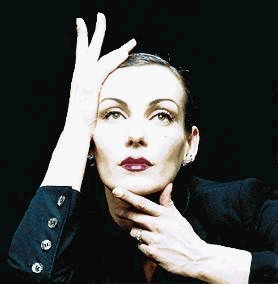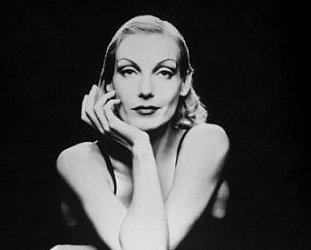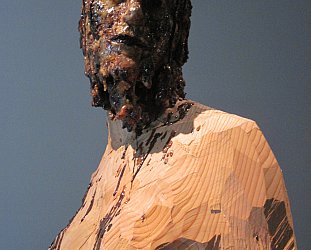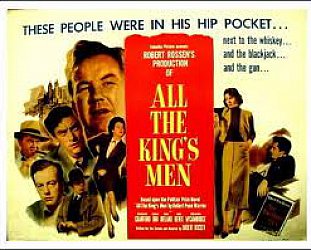Graham Reid | | 10 min read

Midnight on a warm Wednesday in New York City, the Gotham of the Great Republic. The German cabaret maven has come home early from a recording studio across town so, sure, she has plenty of time to talk.
"I'm not an early sleeper," she laughs, somewhat stating the obvious.
This is singer and actress Ute Lemper, once memorably described as like a "Valkyrian dominatrix" whose "smouldering supermodel looks" cast her as a Germanic icemaiden, a sultry vamp, and a sensual icon in the classical world long on sexual marketing but shortchanged on the real thing.
With a substantial part of her long and lean frame being legs, this 39-year-old mother-of-two - Max and Stella - is the genuine article and literally towers over her peers by the sheer stretch of her fishnet stockings. Not that she occupies an especially crowded piece of turf.
Early in her two-decade career this star of Berlin theatre, European art movies, London's West End and Broadway, made her name singing the repertoire of Kurt Weill, Bertolt Brecht and the between-the-wars songs of the Weimar cabaret.
Lemper's songbook of political and social dissent by Jewish and Communist writers was considered Entartete Musik (Degenerate Music) and was stomped by the jackboot of Nazism. In its sexual and social provocation it is uncomfortable music, a challenge from an underbelly. Some of it has been homogenised - the chilling Mack the Knife from the musical The Threepenny Opera now a finger-snap standard in a karaoke bar - but Lemper brings them to life and gives them flesh. Sometimes quite a bit of it.
"There is not a super-large audience for it," she laughs. "It's for people who are interested in the Weimar Republic and the political background, who are also interested in political satire. The Berlin cabaret songs are fun because they are performance material and are made to provoke people, to catch them and tease the hell [out] of them, and make sexual and political fun in whatever subject the song is approaching.
"It was banned by the Nazis and is a niche which doesn't exist any more. Today you have cabaret as an American tradition which is much more lightweight and doesn't include the provocation. I want to present it rather edgy and androgynous, where you can allow yourself a lot of space and to do things you couldn't in an American cabaret. Throughout the years I was looking to bring it into contemporary culture and connecting it to whatever the fear, chaos and danger is in our world, in a political and moral context."
With these often dark songs - and her stunning looks - Lemper made her name on the German, and eventually European, stage in the late 80s and early 90s.
The daughter of a banker father and opera singer mother, she grew up listening to American jazz and pop in Munster, not a place she recalls with fondness. "It was in the tight-minded Catholic Germany of the 60s which was not diverse at all and unconscious about a lot of issues of the past. That non-diversity was really scary if I think back. There was nothing there and everything which surpassed the frame of normality was judged. So that was not the place I wanted to be. I knew as a teenager I had to break out of that world very quick."
She played in piano bars as a teenager, spent two years in contemporary acting classes in Stuttgart performing works by Werner Fassbinder and Anton Chekhov, attended ballet classes in Cologne, and studied classical drama in Vienna. She made her professional debut in Cats after being spotted by Andrew Lloyd Webber.
From there her rise was meteoric: Peter in Peter Pan; Sally Bowles in Cabaret for which she received France's Moliere award for best actress in musical; then a controversial Lola in The Blue Angel when she didn't play the part in the manner of Marlene Dietrich (who was in the original 1930 movie) but with red hair and looking like a Berlin junkie.
She made a pop album, Crimes of the Heart, in '91, collaborated with Michael Nyman on the album Songbook with lyrics from Rimbaud and Shakespeare, and performed with the London Symphony Orchestra and the Israel Philharmonic (among other orchestra). She has appeared at La Scala in Milan, in 1993-94 was named by Billboard as the best crossover artist of the year as she moved from classical to cabaret, has been in movies by Fassbinder and Peter Greenaway (Prospero's Books) and appeared in Robert Altman's Pret a Porter pregnant on a catwalk wearing nothing but a wedding veil.
But it has been her interpretations of the Weill/Brecht songs which won her international acclaim. It is material from this repertoire or songs inspired by it (by Tom Waits, Nick Cave, the poet Charles Bukowsky) that she will perform with her trio at Auckland's arts festival AK03.
It is the historical context of the music she loves as much as the songs. Here was music of decadence and dissent which challenged the cultural mores of society.
"The Weill music in connection with Brecht words is very anarchic, and Brecht's revolutionary repertoire demands an awakened spirit to go out and shout out your right to change society and the world.
"In my early 20s, what became a strong mission was presenting Weill in its whole array: the Jewish roots, the influence of his father who wrote for the synagogue, the classical background, then the height of Weimar times and the collaboration with Brecht. Then into the takeover of the Nazis and the denunciation for being a Jewish composer and for working with Brecht a communist, the exile years in France, and then the adaptation in a musical context to the American music market.
"All of that was a strong story on different levels - political, human, religious and musical - and was interesting for me to tell to my generation. It made people reflect about the German identity in a different time, German responsibility and the way we deal with that.
"It was a vehicle for me to talk about a lot of issues in Germany as a German."
Lemper has never shied from her opinion of Germany as a repressive and authoritarian society. She has spoken often about how the postwar generations simply went back to work without confronting the emotional scar of the Holocaust and with anti-Semitism still in their veins. She has said her family never dealt with it and she doesn't tire of discussing the legacy of Nazism or why she could never live in Germany again.
The cabaret songs of Germany's 20s and 30s - many of which existed only as sheet music and had never been recorded - allowed her to pull these issues into the public domain.
When she relocated from Berlin to Paris she brought the chanson tradition and music of Edith Piaf and Dietrich into her repertoire. In Piaf she heard the tragedy of the life of "The Little Sparrow", in Dietrich she was drawn to the mysterious, exotic and "not clearly feminine" sound of her voice.
LEMPER'S oeuvre has constantly expanded and she is a renaissance woman of the entertainment world. She has held exhibitions of her painting (Expressionist, of course); been in art-house movies and on television dramas; played populist theatre such as Cats and Cabaret; writes her own songs (initially in French, now in English) and, Madonna-like, has set a new threshold for her changing image.
On her Punishing Kiss album of 2000 - songs by Elvis Costello, Tom Waits and Nick Cave alongside Weill and Brecht's Tango Ballad - she appears in breast-hugging black vinyl. For her most recent but one day - her own songs plus Jacques Brel, Astor Piazzolla and more Weill - she sprawls languidly in fishnet stockings and a split skirt, and makes a cigarette look like a sexual symbol in the manner of Dietrich (with whom she corresponded before her death in '92). In photos for her Best of collection she variously evokes Lillian Gish, Katharine Hepburn and David Bowie's Heroes album cover, one of what is known as his "Berlin trilogy".
Her changing image - always slightly aloof and often with a physical sexuality - is emblematic of her peripatetic working life. After living in Paris, then London for a year (because of her West End role as Velma Kelly in Chicago for which she won the '98 Olivier award for best actress in a musical), she was drawn to New York when invited to reprise her part on Broadway.
"I was always attracted by New York and had done many concerts here and I looked for the right reason to finally move over. My husband is American and we spoke English at home most of the time. I love New York - the diversity is overwhelming and you see everything from everywhere, all the culture, all the religions and opinions and all the freaks in the world. There's an acceptance of all of it.
"When I was in Paris or London or Austria I always was 'the German' although I was completely integrated into the cultures, spoke the language and felt the sense of wherever it was I was living. But Europe is full of cliches and hostilities and arrogance. Most of it still leads back to the Second World War and the issues involved in that. It's full of prejudice.
"In New York everybody is a foreigner, but we are all New Yorkers."
She is not enamoured of America as a whole. She considers the moralism and patriotism "very spooky and scary", and the politics provincial. At heart she is still a European - Berlin remains her favourite city because it is so marked by history - but prefers the freedom of New York, "the most European city in America".
In a little over a decade Lemper has consciously made the progression from being "trapped in this very happy place on the mission of re-recording historical repertoire" through working with contemporary songwriters such as Waits and Costello, to writing her own material in the cabaret art-music genre. Her song Lena is inspired by the daughter of Holocaust survivors and how she deals with that knowledge.
"For me I have to write like that, that's why I am not a commercialised pop singer. I do what I do and have the freedom to do that. I am under no commercial obligation.
"All my stories have a search for the more doubtful aspects of life, the interpretations, identifications, stories telling about losers, the anti-hero and those who search and don't find the answers but still have a strong passion for life and survival."
She is attracted to the underground and the avant-garde but admits maybe these things no longer exist: "The interesting vision always comes out of the underground and oppression. The interesting poetry and literature always from the chaos, the dark, and is about the search for the light, freedom and peace. It never comes out of the establishment and state-sponsored art or entertainment.
"But today everything is allowed so it is difficult to find anything that comes out of the underground - because there is no underground. The underground is already hip and not underground any more. It's a little difficult to say what is even avant-garde today.
"Right now I like to do music. I always felt a little misplaced in the movies or straight acting. Even when I was on Broadway or in musicals I felt misplaced as an artist and performer. I had to work in a certain style and system of presentation which I didn't like.
"My vision changes every time I perform, but that's not permitted on Broadway where you have to stay true to whatever is created at the root of it.
"I like to always walk on the fine line, and that evolution so you can never be trapped in yesterday, always looking for tomorrow and new developments and inspirations, always open to changes.
"That's what I like, nothing ever being defined, always inspired by new things."







post a comment